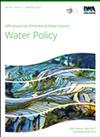评估美属维尔京群岛全地区家庭水储存和处理计划的成本和组成部分
IF 1.8
4区 环境科学与生态学
Q4 WATER RESOURCES
引用次数: 3
摘要
在岛屿社区中,水的安全和获取仍然是一个关键问题。在美属维尔京群岛(USVI), 90%的家庭能够收集屋顶收集的雨水,而只有不到25%的家庭连接到由海水淡化厂提供服务的市政供水系统。雨水收集让家庭负责管理和处理自己的水。因此,了解目前获取水处理技术的障碍,以及大规模水储存和处理计划的成本,对于制定一项全港性计划至关重要。在本研究中,我们评估了(1)家庭层面获取水处理技术的障碍,(2)紫外线水处理试点项目的成本分解,以及(3)在全港范围内对项目成本的潜在估计。结果表明,对于家庭来说,主要障碍包括对问题或解决方案的了解以及资金和安装成本。从方案成本评价来看,水处理技术和水检测服务是最昂贵的。然而,考虑到关键的调整,一项覆盖50%家庭的全港性计划估计将耗资3040万美元。这些数据可以被利益相关者联盟用于分配财政和管理责任,为美属维尔京群岛的一个全领土的水储存和处理计划。本文章由计算机程序翻译,如有差异,请以英文原文为准。
Evaluating the costs and components of a territory-wide household water storage and treatment program in the US Virgin Islands
Among island communities, water security and access continue to be a critical issue. In the US Virgin Islands (USVI), 90% of households are capable of collecting roof-harvested rainwater, whereas less than 25% of households are connected to a municipal water system serviced by desalination plants. Rainwater collection leaves the household in charge of managing and treating their own water. Therefore, understanding current barriers to accessing water treatment technologies and the costs of a water storage and treatment program at scale are critical in developing a territory-wide program. In this study, we evaluate (1) household-level barriers to accessing water treatment technologies, (2) a cost breakdown of a UV water treatment pilot program, and (3) potential estimates of program costs at a territory-wide scale. The results suggest that for households, key barriers include knowledge of the problem or solution and capital and installation costs. From the programmatic cost evaluation, the water treatment technology and water testing services were the most expensive. However, given key adjustments, a territory-wide program is estimated to cost $30.4 M covering 50% of households. These data can be used by a coalition of stakeholders in allocating financial and managerial responsibility for a territory-wide water storage and treatment program in the USVI.
求助全文
通过发布文献求助,成功后即可免费获取论文全文。
去求助
来源期刊

Water Policy
环境科学-水资源
CiteScore
3.10
自引率
12.50%
发文量
81
审稿时长
6-12 weeks
期刊介绍:
Water Policy will publish reviews, research papers and progress reports in, among others, the following areas: financial, diplomatic, organizational, legal, administrative and research; organized by country, region or river basin. Water Policy also publishes reviews of books and grey literature.
 求助内容:
求助内容: 应助结果提醒方式:
应助结果提醒方式:


